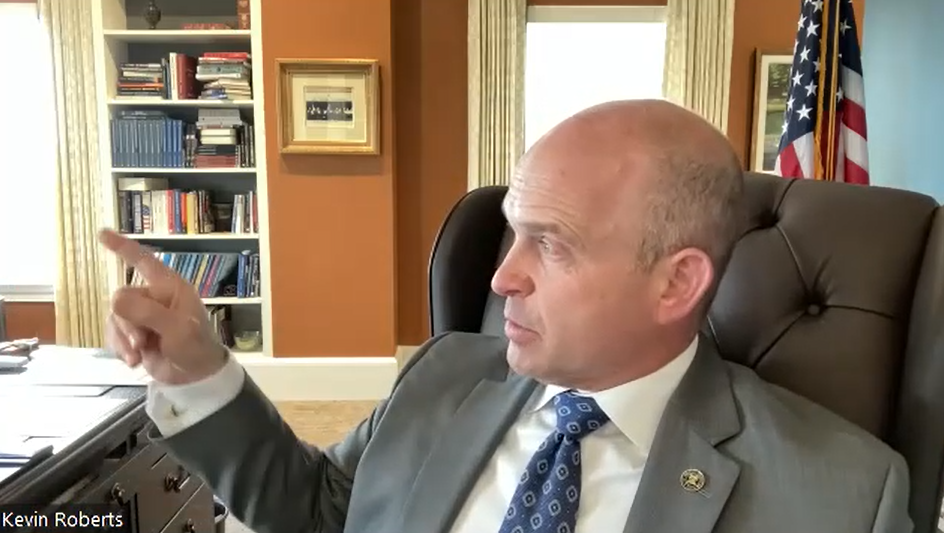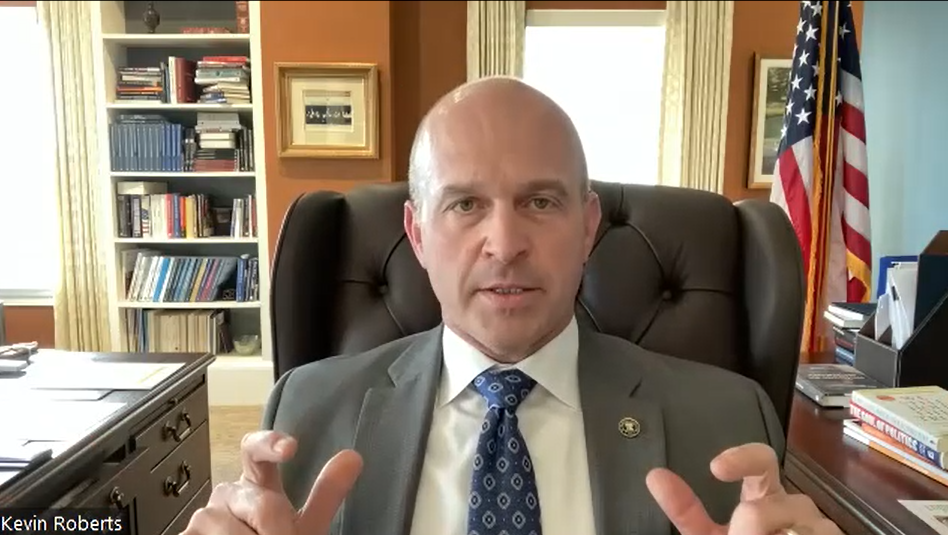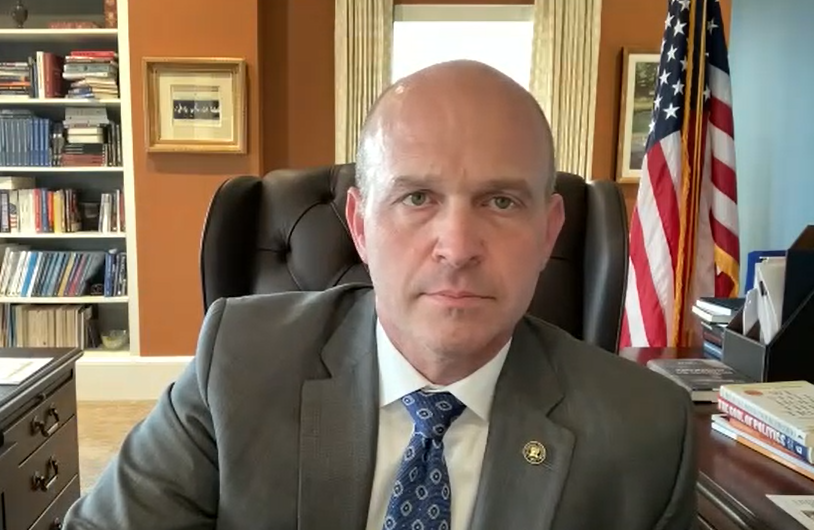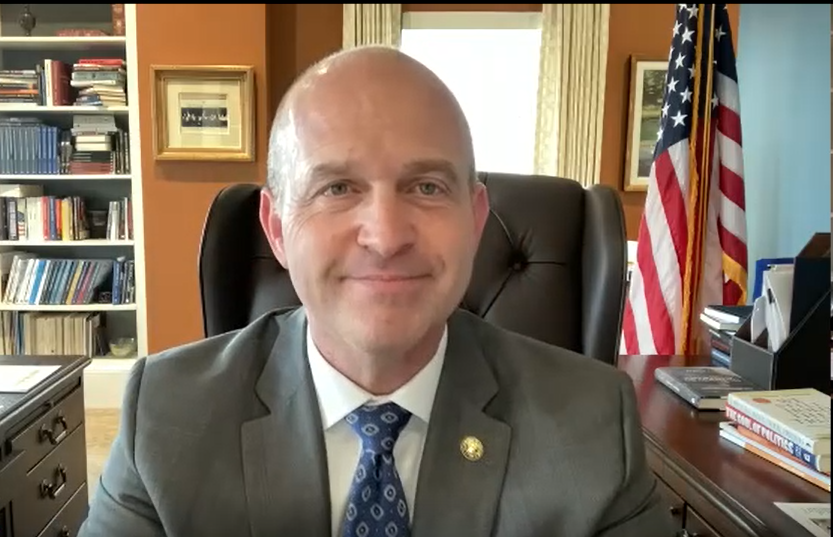Lafayette’s Kevin Roberts has served as President of the Heritage Foundation since 2021. The Heritage Foundation, located in Washington D.C. and recently celebrating its 50th anniversary, is considered by many to be the nation’s most influential think tank. Roberts is the guest speaker at Lafayette’s John Paul the Great Academy’s Veritas Lecture and Gala Dinner this Saturday. He spoke this week via zoom with Covenant Spotlight on ways to advance and preserve a local conservative and Christian heritage.

LEWIS: Kevin, you are originally from Lafayette and served as the headmaster at John Paul the Great Academy until 2013. You left coincidentally the week after you and I met and we decided to send our children to that school. Am I correct in assuming that the timing of your leaving and my decision was a complete coincidence? (laughs)
ROBERTS: Yes, that’s a complete coincidence, my friend. (laughs)
LEWIS: Good. That’s been the question for which I set up this whole interview. I just wanted to make sure. (laughs)
ROBERTS: In fact, as an addendum to that, I was sorry to miss getting to know you well because we really hit it off and felt badly about that. But, I think things have worked out.
LEWIS: Yes, bigger things called you. But, I had the same regrets. Given your work in Washington with Heritage, are you able to keep up with local issues, politics and news?
ROBERTS: My family and I have lived in a lot of places including going back to Louisiana to found and open the school. So, I keep up with local politics, state politics in Louisiana, in Wyoming, where we went after Lafayette and in Texas, especially Central Texas, around Austin, where we’ve been a couple of times. So, I’m a big believer that the best news to follow is local news because it’s the news that affects us the most. Christian, for the purposes of your magazine, and for my own purposes and that of Heritage, it also helps us build community. It helps us see across partisan divides and other lines that tend to divide us. I think it’s really important for us to get past that, when and how we can.
LEWIS: When you talk about building community, are you talking about policies and practices that would apply at the local level?
ROBERTS: Yes. I’m talking about the reality that in most questions of local government, it’s not a Republican versus Democrat issue. We have a tendency in modern America to politicize everything we really shouldn’t. And the point is, when it comes to paving roads, when it comes to ensuring public safety, it’s not a Republican versus Democrat thing. To the extent that we can push away the national political pressures that put us in one tribe or another, and focus on human flourishing at the local level, I think that’s best. That allows us to build community first.
My wife and I try to do this in our current neighborhood in Northern Virginia. I’m sure the neighborhood is pretty much split 50/50 along Republican and Democrat lines. But, we all get along because we’re all focused on making sure we’re good neighbors, providing help to one another when someone needs it, and then doing the things that local governments do as a homeowner’s association. We take care of our own road. We take care of the flowers. We take care of repaving. These are the kind of “blocking and tackling” ways that we can build community.
LEWIS: You talked about national politics entering into local politics. Former House Speaker Tip O’Neill used to say, “All politics is local.” This no longer seems to be the case. It seems that national politics are playing a bigger role in local politics whether it’s BLM or Trump. Is this a new phenomenon and, if so, to what do you attribute it? Is it a good thing?
ROBERTS: It’s not new, and it’s not good. But it is more profound today, I can tell you as a historian of the United States, than it’s ever been. For example, in the late 1790’s or early 1800’s, the growing partisan division between John Adams and allies versus the Jeffersonians was really significant. One would feel that in one’s community. The newspaper that you would read would be aligned with one or the other. Politics then was vicious. Things improved until the Civil War. But for most of American history, national politics took a backseat to local issues with obvious exceptions for transcendent events like a World War. For most of American history, we were really focused on what was going on in our city or county, to some extent, our state.
Christian, the reason that I think it’s such a problem today represents how significant a role the federal government plays in our lives as individuals. It will come as no surprise to you, given my own philosophical worldview as a limited government conservative, that this is a problem. But, whether someone’s in the Republican tribe or the Democrat tribe, those are not religions. Political parties are not religions. The people who are in our neighborhood are far more important than our political alliances.
LEWIS: What’s the solution? My impression is that even the Republican Party within Lafayette is breaking down into a Trump camp versus a non-Trump camp.
ROBERTS: Well, I’ll give you two or three solutions. But, I’ll first respond to your observation about the political right as it were in Lafayette breaking into two camps sort of Trump aligned and not Trump aligned. I think that’s right. For what it’s worth, I see that around the country. And it’s also kind of natural that when one of the two political movements in the country, whether the right or the left, is ascendant and large enough in a particular area, as the political right is in Lafayette, of which I’m a product, then it’s going to break into some camps.
The solutions are number one electing leaders running for mayor-president, governor or state legislator who can get opposing camps to talk to one another. That’s a very difficult thing to do but I actually see improvement in that regard over the last several weeks across the country.
The second, leaning upon one of de Tocqueville’s observations, is that if Americans have a problem with their leaders, we need to look in the mirror. We ourselves need to do a better job of not being put into opposing tribes even if we might feel a real strong personal allegiance to the former president or the opposite. What is more important are the humans in front of us, our fellow citizens.
The third thing is to be careful about the news we consume. I have the privilege of doing a lot of interviews with national outlets. I don’t want my comment to be disrespectful to them because I’m grateful to be able to do that, but I don’t consume a lot of national news. As I sit here doing this interview with you, Christian, I have the privilege of looking out my office window and could throw a rock and almost hit the US Capitol. My day is spent just sort of consuming national news. But in my personal time, I want to be with my family. I want to be with my friends. I actually make a point of listening to local podcasts from your area and other areas from across the country. The reason for that is it cuts past the national tribes. In other words, doing local politics well can cut past those tribes. It’s really crucial that we do it.

LEWIS: When you talk about trying to get past tribal divisions, you still hold out the hope that there is at least a common ground upon which we can do so. I read in The Washington Examiner recently a quote from you that makes me think that there is some point where you believe that’s no longer possible, “We want to be civil wherever and however we can. But I think my experience with the radical Left and academia and policy here in D.C. shows they don’t play by the rule. And so, reestablishing the rules means figuratively, we got to bust them and bloody their noses sometimes.” (Washington Examiner 4/20/23) https://www.washingtonexaminer.com/policy/think-tanks/heritage-foundation-celebrates-50th-anniversary
I think you’re saying that with some there is no longer the possibility of common ground. I would agree with you and liken them to the Bolsheviks in early 20th century Russia. Richard Pipes’ excellent book “The Russian Revolution” lays out that there could be no lasting common ground with the Bolsheviks. They eventually turned on everybody, even those who at one time allied with them. Discourse with them was impossible because they weren’t interested. They would lie and they would change the rules as they went about seizing power. Is that where you’re drawing the line?
ROBERTS: Yes, in fact, your comparison of the Bolsheviks in the 1910s and 20s and the modern American radical left is apt. I mean, it’s eerily so because the modern American radical left is so vicious. So evil, so nefarious, that they eat their own not unlike the Jacobins in the French Revolution. These groups all share ideological strands, right? And so, you can’t find common cause with people who want to call men, women and women, men and tell me that I’m crazy for believing the most obvious scientific biological truths.
Having said that, the reason we want to confront them, as you mentioned, referring to a comment I made last week, to figuratively “bloody their nose” is that you must neutralize their nonsense and their absurdity for the very purpose of getting back to regular order and civil discussions with people across the political spectrum. What’s happened is that a tiny part of the fringe on the left is driving the conversation. It’s incumbent upon a few of us who are in positions to figuratively bloody their noses to do so to make the space as a civil society to have the more responsible, more civil conversations we used to have.
LEWIS: I’ll give you a local example. Currently, the Library Board has been dealing with the issue of what is appropriate for children to be able to access within the library. During the course of these meetings, there’s disruptions from the opposition that shuts down the meeting including screaming to the extent that they had to have people removed because it no longer allows discourse or the Board to function. Are there other examples that you’re thinking of where common ground is impossible?
ROBERTS: My experience in higher education is another example. I’m not invited as the President of Heritage to speak to public universities because of our conservative principles. I would be protested and there would probably be other uncivil disobedience by the radical left. There are a lot of speakers, Matt Walsh, Molly Hemingway, who are confronted with this every week, and a lot of their speaking engagements get cancelled. The worst happened last summer to members of the US Supreme Court who after the draft of the Dobbs decision was leaked were scared to be in their own homes because the radical left was, particularly in the case of one justice, wanting to take their lives. In a couple of those cases, death threats were daily. These were real legitimate concerns for law enforcement. This is no longer the heckler’s veto at a college graduation protesting a commencement speaker. These people hate us and they hate what we stand for. While a political common ground with the radical left may be humanly beyond us, we both know the hope of the gospel can change the hardest of hearts.

LEWIS: What policies and practices would you recommend for communities, and specifically Lafayette, for local conservative Christians to adopt to preserve our heritage?
ROBERTS: Well, the first and most important thing, and this will sound like a really big solution for a very specific question, is to be sure that you’re in your church regularly, not just attending, in my case Mass, but you’re really invested in your church as a community to conserve our cultural and religious patrimony.
The second thing is that we need to lead conservative lives. The best way to honor our heritage, broadly speaking, is to make sure that we’re getting married and having children, if that’s possible, and we’re also really active in the lives of our friends. You see the best antidote to an overcentralized government, the best antidote to the radical American left is to take a very simple approach to life and focus on the human. When we focus on the human and we control what we consume in terms of news, even our pleasure reading, our television and radio consumption, and we’re focused on the good, the true and the beautiful, that’s how we rebuild and revitalize society.
But it’s hard, Christian, as you know better than most. Those commitments are our long-term solutions. But I also know that in places where heritage runs deep, and South Louisiana is one of them, that the seeds are being planted. In spite of some of the political discord that happens and has happened in Lafayette, if we can simply sow those seeds, we can fertilize them with good behavior and good community. That’s how we reclaim our country.
LEWIS: Back to education, we’ve had a long history in the United States of universal education, but I’m not sure if that necessarily means it must include state directed education. I know vouchers and school choice programs have different permutations. What are some alternatives to state directed education that doesn’t have strings and minimizes the role that state or federal government can play in dictating policies in elementary and secondary education?
ROBERTS: This is one of two policy areas in which I might claim expertise. The other would be higher education. I always start from scratch. In other words, we’re just building this system of schools from scratch. Now, I happen to believe as a conservative, that there ought to be a commitment by our American civil society to public schools because they help transmit values from one to the next. I abhor, however, the Horace Mann model that we’re under which is now almost two centuries old because it’s outdated.
We will get where we need to by the way to this this policy innovation: Whatever the per pupil allotment is that the people of Louisiana have committed to through your legislature, I would guess probably $16,000 or $17,000, would all go into an account held by the State Treasurer in the name of every family with a sub account for every child. The state already should have this information because of its Department of Revenue. That money, through the form of a card or an account, would be given to the parent to decide where the children go to school. It could be Lafayette High School, where I went. It could be Lafayette High School for three days a week, and then services other than that such as homeschooling, which is what my wife and I have done in the last 10 years.
The point is, we’re stuck as a people in an old model but with a very strong desire to change it. I happen to believe that some of the school choice legislation that’s now law just this year, in places like Iowa, is something that Louisiana and every state needs to pass. I’m really excited about the benefits of that not just for the education of the kids, but for society at large.
LEWIS: Is the Iowa plan similar to what you just described where the cash travels with the kid?
ROBERTS: That’s exactly right, every child. The bill that hopefully will be passed in Texas this year, and one Heritage is playing a big part in getting down the field, is very similar.
LEWIS: Could I suggest maybe instead of calling it public education that we start using the term “universal” because public implies state directed where universal conveys that we’re in favor of educating everybody, just not state directed?
ROBERTS: Words matter in our business. As I tell people, education is our conservative patrimony.

LEWIS: At the local level, though, it still seems that a missing element is the ability to counter the progressives’ shaping of the cultural and political narrative through media and news sources. They spin a narrative story and use it to shape public policy. It’s my impression that conservative Christians are doing, but can do better, the things you suggested. How can conservatives do better shaping the narrative?
ROBERTS: The political right does politics very poorly. One reason is because we are focused on trying to lead conservative lives. There is only so much time in the day. The second reason that we do politics poorly is that we spend too little investing in local media outlets that are at least fair to our side. We need at least one independent media site in Lafayette, not from a particular perspective necessarily, but one that is stating the facts. Never, never, never should the political right talk about any policy issue that accepts the narrative framing of the left. We need to be creating our own outlets that are more favorable to our framing. This is essential.
The third thing is we need to do, while we are raising our families and building our businesses, is to carve out time to be involved in policy advocacy groups. Top of mind for me is what my friends in Florida have done in forming “Moms for Liberty”. They have chapters around the country and I think over 200,000 members now. The reason these very busy moms raising kids have been politically influential in public schools, arguably the most influential conservative effort in the last half decade, is because of the angst that so many parents feel about what the radical left has done to our kids in government run schools. Such groups allow parents to focus on education, quality of life, and public safety.
LEWIS: Turning to a personal question, Tony Perkins is a fellow Louisianan who was a politician who then became a president of a think tank at Family Research Council. Have you considered the inverse course: being the president of a think tank and coming back to Louisiana to become a politician?
ROBERTS: (laughs) Well, you know, the short answer is no. Tony, by the way, is one of my friends and frankly heroes and mentors. I see him some up here in DC but he’s got the good sense of being based in Louisiana. I get that question a lot. It’s very kind of people to say, but I have the job that I’m called to do. No arrogance intended in this but my job at Heritage is to produce a situation in which conservative men and women who might otherwise do something other than run for office, become compelled to do so because of our good work at Heritage. That’s my way of saying, I know that my influence and highest value is on the outside of the political process. I also just happen to love policy and ideas rather than campaigns and elections. So, I’ll be doing what I’m doing as long as my board is happy and they seem to be very happy right now. And, and we’re going to reclaim our country.
LEWIS: So, my interview headline will not be, “Roberts for Governor in 2023 or 2027”? (laughs)
ROBERTS: No, it’s not going to happen. My wife, who’s from Crowley, always says, “Bloom where we’re planted.” So, as residents for the third time in my life in the Commonwealth of Virginia, we are focused as citizens on making the Virginia assembly, even redder, but not by running for office, but by helping those who are.
LEWIS: You are a UL graduate, and you also went to and have a degree from UT Austin. In 2021, UL played Texas in football. Who did you pull for?
ROBERTS: I pulled for the Horns for two quarters and the Cajuns for two quarters.

LEWIS: Okay, that doesn’t give me any more insight into whether or not you’re going to run for governor one day in Louisiana. That is a very political answer. It does leave the door open though, Kevin. This Saturday you will be in town as the keynote speaker for the John Paul the Great Academy’s fundraising gala. What do you hope to accomplish and about what will you be speaking?
ROBERTS: Well, what I hope to accomplish is to express gratitude to everyone in the room, and others who may not be able to make it, on what they’ve done in the school over the seventeen years since it was an idea of mine, and the Holy Spirit, of course, smiled upon that. The second thing I’m going to be talking about is our patrimony. Our patrimony as Acadians, whether from Nova Scotia, other parts of Europe, Africa, or Asia, is the anchor culture in South Louisiana. The Acadians really drive how we understand patrimony. Secondly, our patrimony as Americans. Thirdly, our patrimony as Christians. It’s really important to understand that South Louisiana puts all of those together. I am going to argue, taking no credit for this as the founder, that John Paul the Great Academy is one of the preeminent institutions that pulls this together in the most important ways including its belief in universal education.


